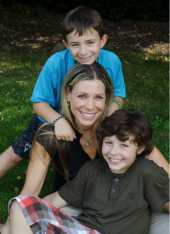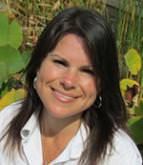To finish Earth Month with a flourish, we are profiling several students, faculty, and staff to capture the outstanding group of sustainability leaders on our campus. Our first profile is of Lisa Kimmel and Danielle Casioppo of Being Well at Yale and more will follow. We hope you enjoy reading about the exciting work that these members of our community are undertaking to help build a better Yale.
Ken Hajducky, Facilities Superintendent
Think back to your high school or college chemistry class. You probably remember working in a lab with chemical reagents, Erlenmeyer flasks, and Bunsen burners. But did you ever wonder who stocked your lab with all of these materials and maintained the facility?
With hundreds of research labs on Yale’s campus, Facilities Superintendents like Ken Hajducky, who manages Yale’s chemistry buildings, have to coordinate a portfolio of operations.
“We have over fifty labs in Sterling Chemistry Lab and the Class of 1954 Chemistry Research Building,” said Hajducky. “All of them require cleaning, maintenance, supplies, power – the list goes on.”
Keeping Yale’s chemistry buildings in world-class condition is Hajducky’s mission. And he believes that sustainability is an essential component to maintaining clean, efficient, and productive facilities.
“Many of our operations benefit from sustainable practices,” said Hajducky. “For example, after we implemented lab recycling, we noticed a significant improvement in recycling rates – which makes our facilities less wasteful, more efficient, and more cost-effective.”
Labs require significant amounts of energy, materials, and labor to produce groundbreaking research. Hajducky’s commitment to pursue initiatives that optimize energy and material use is admirable and stems from his interest in corporate responsibility.
“I look at companies like Unilever that are really concerned with how their products and actions impact the health and environment of their customers, as well as the locations they operate in, and I ask myself, ‘How can I replicate what Unilever is doing in my position at Yale?’” said Hajducky, whose wife works for Unilever.
Yale resembles the corporate giants of sustainability, according to Hajducky.
“Sustainability is embedded into the culture and operations of Unilever, and I believe we have that here at Yale.”
How we continue to expand that culture of sustainability, Hajducky noted, will dictate our future.
Corey Johnson, School of Forestry & Environmental Studies ’15
 Sustainability has become a buzzword over the past decade. The catch-all tries to put our vision of the efficient, restorative, and healthy use of resources in a nutshell. But many savvy professionals, including Corey Johnson ’15 M.E.M., are interested in cracking that nutshell to find out what sustainability looks like on the inside today—and to consider how it may need to adapt moving forward.
Sustainability has become a buzzword over the past decade. The catch-all tries to put our vision of the efficient, restorative, and healthy use of resources in a nutshell. But many savvy professionals, including Corey Johnson ’15 M.E.M., are interested in cracking that nutshell to find out what sustainability looks like on the inside today—and to consider how it may need to adapt moving forward.
Redefining sustainability in terms that are ambitious enough to address the effects of our changing climate is the focus of Johnson’s research on university greenhouse gas accounting at the School of Forestry & Environmental Studies. Cracking the nutshell, he believes, is about asking the right questions.
“Many universities set goals to reduce greenhouse gas emissions,” said Johnson. “But are these goals aggressive enough to prevent us from crossing a potentially dangerous climate threshold?”
Johnson answered this question by developing a tool that universities can use to compare campus emissions to a global emissions scenario designed to limit global warming to two degrees centigrade.
“By looking outward and placing university sustainability performance in the context of global climate change, universities can develop more meaningful targets,” said Johnson.
In addition to his research, Johnson manages the Sustainability Service Corps, a group of over twenty undergraduate students working to integrate sustainability throughout Yale College. Prior to Yale, he worked as a Sustainability Research Analyst at Pax World Investments and studied business at the University of New Hampshire.
Although he has cracked the nutshell at Yale, Johnson believes has only scratched the surface.
“The question that keeps me up at night is, ‘Are we doing enough?’” said Johnson. “Until we can answer with a definitive ‘yes,’ we need to continue to rethink sustainability as we know it.”
Corey will be working for Booz Allen Hamilton in their energy and environment practice next year.
For more information about sustainability leadership at Yale, visit our April campaign.
Lisa Kimmel and Danielle Casioppo, Being Well at Yale
Many sustainability professionals and leaders talk the talk, but how many walk the walk?
By promoting health and wellness as a core component of a sustainable campus community, Being Well at Yale’s Lisa Kimmel and Danielle Casioppo walk the walk…literally.
 And as of March 23, over 2,500 Yale employees have joined them on a virtual trek of the 2,200-mile Appalachian Trail.
And as of March 23, over 2,500 Yale employees have joined them on a virtual trek of the 2,200-mile Appalachian Trail.
“Right now we have teams in Shenandoah National Park, the Delaware Water Gap, and October Mountain,” said Kimmel. “Several teams have even made it as far as Mount Washington.”
Kimmel’s enthusiasm for the power of cumulative step-based exercise is contagious.
“It’s exciting to see how you can take a few thousand steps each day and have them add up to two million steps over eight weeks,” said Kimmel, a Registered Dietian, author, and Yale’s 2013 Working Mother of the Year. “That additive effect is motivational and keeps people going.”
Being Well at Yale’s goal is to engage and support employees in their progression towards healthier lifestyles through a portfolio of programs, ranging from physical activity challenges to stress management classes. But envisioning and building a culture in which wellness is a community priority is not without its fair share of river crossings and difficult ascents.
“Let’s face it: people at Yale are very busy,” said Casioppo. “For some employees, even making time for a fifteen minute walk can be difficult. That’s why we try to encourage employees to build exercise into their workday by taking the stairs, walking to meetings and biking to work when possible.”
But Being Well at Yale has maintained a steady pace and continues to develop a culture of wellness at Yale. Employees have access to nutrition and weight management programs such as Weight Watchers at Work. There are also physical activity programs, ranging from maps of campus walking routes to step-based walking challenges, in addition to stress management programs such as Mid-Day Mindfulness Meditation and Take A Paint Break.
“Wellness is about much more than physical fitness,” said Casioppo, a certified yoga instructor. “Integrating body and mind is critical to your overall health and well-being.”
And health is closely tied to the environment, according to Kimmel and Casioppo. Take sustainable commuting, for instance, as an illustrative example. Fewer single occupancy vehicle commuters and more walkers and bikers has the potential to reduce emissions and improve local air quality, positively impacting health in the form of fewer cases of asthma and improved cardiovascular health.
“There’s no ignoring the connection between human health and environmental health,” said Casioppo.
Being Well at Yale also addresses other health concerns like smoking through its cessation program, Fresh Start, which has already helped many employees quit. 
“Simple life choices can not only improve health, but also lower financial costs for healthcare providers,” said Kimmel. “It’s a win-win situation: healthier, happier employees make the university a healthier, happier place to work – and employees bring healthy habits home to their families.”
We hope you joined the Appalachian Trail Challenge, which ends May 17. Our office’s team, Yale Sustainability, is currently ranked 8th. See you on the trail!